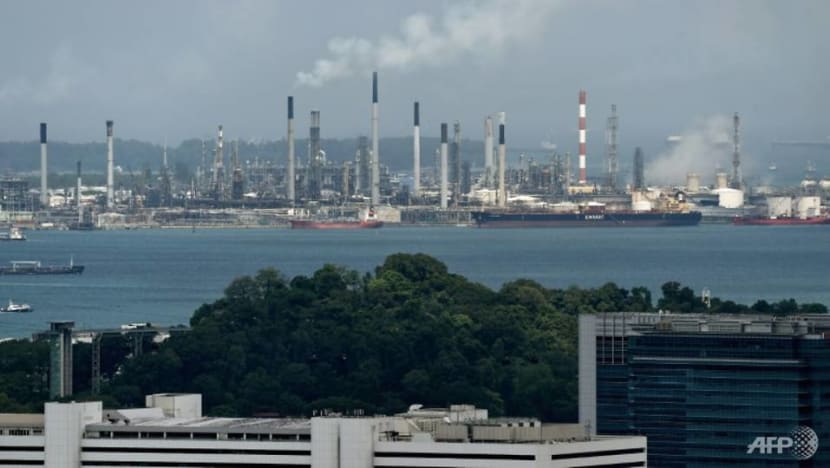No 'free pass' on carbon emissions for companies receiving transitional allowances: NCCS
The National Climate Change Secretariat was responding to an open letter by environmental groups calling for more transparency and accountability on Singapore’s carbon tax policies.


This audio is generated by an AI tool.
SINGAPORE: The transitional allowances that partially offset the carbon tax of eligible companies temporarily are "not a free pass" for them to continue emitting, the National Climate Change Secretariat (NCCS) said on Wednesday (Sep 10).
At the same time, the publication of information about the allowances should be balanced against the need to protect the legitimate commercial sensitivities of the companies.
The secretariat, which was set up under the Prime Minister’s Office, was responding to a call to improve transparency and uphold public accountability regarding Singapore’s carbon tax policies by four environmental groups on Tuesday.
“We welcome the feedback on our carbon tax policies, and we are encouraged by the interest in climate action, and the acknowledgement that carbon tax will have a social cost,” a spokesperson from NCCS told CNA.
To this end, the authorities are “carefully managing” trade-offs between climate action, economic and social considerations.
The open letter on Sep 9 by Energy Colab, LepakInSG, Singapore Climate Rally and Singapore Youth for Climate Action was aimed at highlighting “areas where stronger commitments are required” to ensure that Singapore’s carbon tax remains effective and fair in the years to come.
Among other things, the groups urged the government to be more transparent about these transitional allowances, as well as to make public the effective carbon tax rate.
The letter noted past reports on how certain petrochemical companies were offered rebates for 2024 and 2025 to ease cost strains, and that the projected 2024 tax revenue from carbon tax was lower than expected.
“These calculations cast serious doubt on the comprehensiveness of Singapore’s carbon tax. Hence, we call on the government to release the range of effective carbon tax rate paid by taxable facilities,” the letter said.
In its response to the environmental groups, NCCS said a transition framework which grants such allowances to eligible companies is needed to reduce the risk of companies relocating out of Singapore by providing time for them to make “necessary investments for their transformation”.
“This is particularly relevant amidst current political and economic headwinds confronting climate action. Such an outcome would result in the loss of jobs and economic value to Singapore, with no overall global reduction in emissions,” the spokesperson said.
NCCS did not mention specifics about the headwinds faced by climate action.
Singapore first implemented a carbon tax in 2019, in line with the country’s goal of achieving net-zero greenhouse gas emissions by 2050. It was the first country in Southeast Asia to do so.
Today, the carbon tax covers about 70 per cent of Singapore’s emissions. The revenue is used to support decarbonisation efforts and cushion the impact on households, among other measures, the NCCS said.
When the carbon tax was first rolled out in 2019, businesses that emitted more than 25,000 metric tonnes of greenhouse gas a year had to pay S$5 (US$3.90) per tonne of carbon dioxide equivalent (tCO2e) produced.
From 2024, the carbon tax was raised to S$25 for every tonne of greenhouse gases produced. The rate will increase to S$45 in 2026 and 2027, and eventually S$50 to S$80 by 2030.
Said the NCCS spokesperson: “The government will share more information on the post-2027 carbon tax trajectory in due course.”
CALLS FOR GREATER TRANSPARENCY ON TRANSITIONAL ALLOWANCES
To ease the transition for some firms, transitional allowances were provided for certain “emissions-intensive and trade-exposed sectors”, such as those in the chemicals, electronics and biomedical manufacturing industries.
The environmental groups called for the authorities to release the range of effective carbon taxes paid by facilities, and to clarify the benchmarks provided to decide the amount of allowances awarded.
Without facility-level disclosures, it is “impossible” to verify whether the allowances applied are “fairly and genuinely transitory”, the groups wrote.
“Questions remain whether the framework strikes the right balance between ambition and protection, and whether the price signal is effective enough to drive deep emission cuts,” the groups wrote.
The groups noted that there is currently no public information on the effective carbon tax rate after allowances, although estimations have been reported.
In June, The Straits Times reported that the projected revenue collected from Singapore’s carbon tax for 2024 was lower than expected, despite the fivefold increase in tax rate that was implemented that year.
Reuters also reported last year that Singapore offered refiners and petrochemical companies rebates of up to 76 per cent for its planned carbon tax for 2024 and 2025.
As a result, companies paid between S$6 to S$10 per tonne of carbon equivalent, or up to four times lower than the supposed rate.
In its response to the open letter, NCCS said companies in these sectors are at a higher risk of carbon leakage – or relocation to other jurisdictions with lower or no effective carbon prices.
It added that the allowance awarded to facilities is pegged to “industry efficiency benchmarks”.
NCCS said the allowances are limited to only a portion of companies’ emissions, and that the amount awarded will be reviewed regularly.
Remaining emissions are subject to the prevailing carbon tax rate. Allowances also do not cover indirect greenhouse gas emissions, such as those produced from the electricity that the company uses.
“It is important to note that allowances are not a free pass for our EITE (emissions-intensive and trade-exposed) companies to continue emitting,” the spokesperson said, adding that eligible facilities must have “credible net-zero decarbonisation plans”.
As for the call for facility-level data on allowances, the NCCS spokesperson said that the authorities have “carefully considered” the potential impact on competitiveness for companies and the “desire for more transparency”.
Companies have raised concerns about how information on allowance could be used to “compromise their strategies and operations”, the NCCS spokesperson said, adding that the aggregated information will be released “in due course”.
PROTECTION OF CONSUMERS, MORE PUBLIC ENGAGEMENT
Apart from the transitional allowances issue, the environmental groups also called for greater protection of consumers who may have to pay higher prices due to the increased carbon tax.
The letter noted that certain companies are not granted allowances, such as power generation and waste management firms.
The environmental groups urged the government to provide support to vulnerable households, which might be disproportionately affected, through permanent rebates or a tiered pricing model.
In response, the NCCS spokesperson said that they are “mindful” of the potential impact of the carbon tax on households’ utility expenses.
The authorities had previously provided an additional S$20 of U-Save per quarter for two years to eligible HDB households to cushion the impact of higher utility bills, under the S$1.1 billion cost-of-living package announced in Sep 2023.
Under the enhanced Climate Friendly Households Programme, eligible households could also claim S$400 in climate vouchers to switch to resource-efficient appliances and fittings.
Finally, the environmental groups called for more meaningful public engagements, such as public consultations and citizens’ panels, to take into account the perspectives of households and other stakeholders.
Any deviation from planned carbon tax levels should be clearly explained, with disclosure of stakeholders supporting it, to improve transparency and accountability, they said.
The NCCS spokesperson said that the government has “consistently engaged” both the private and people sector in their climate policies, including carbon tax policies, and will continue to do so.
For example, the NCCS held a public consultation in 2017 to seek feedback and suggestions on the carbon tax policy when it was first introduced in the government’s budget for 2018.
In 2022, the Ministry of Sustainability and the Environment also launched a public consultation exercise organised by REACH – the government’s feedback unit – to seek feedback on the draft Carbon Pricing (Amendment) Bill.
NCCS also recently ran an online public consultation from October to November last year on Singapore’s decarbonisation journey, in which 580 respondents gave feedback on Singapore’s carbon tax policy.
The findings of the consultations were published on the NCCS and REACH websites.
















